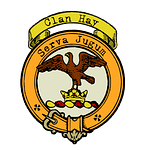Welcome back to "A Clan A Day Podcast." I'm your host, Colin MacDonald, and today we're diving into the fascinating and complex history of Clan MacNeil. This clan, known for its seafaring prowess and fierce independence, is primarily associated with the Outer Hebridean island of Barra, but its origins and influence extend far beyond this remote corner of Scotland.
Clan MacNeil, or Clan Niall as it is sometimes known, traces its roots back to the medieval period, with a lineage that intertwines both Norse and Gaelic heritage. The MacNeils claim descent from Niall of the Nine Hostages, a legendary Irish king. However, modern DNA evidence suggests a more Viking origin, reflecting the clan's maritime nature and the Norse influence that pervades the Western Isles. This discovery has led to a re-examination of the clan's history, adding a new layer to its already rich narrative.
The MacNeils are unique in that they are divided into two distinct branches: the MacNeils of Barra and the MacNeils of Gigha. These two branches, while sharing a common name, have developed independently over the centuries, with their own territories, allegiances, and even rivalries. The Barra branch is the more famous of the two, known for its strategic stronghold at Kisimul Castle, which still stands today as a symbol of the clan's enduring legacy.
The history of Clan MacNeil begins with the figure of Nigellus Og, who received a charter for the island of Barra from Robert the Bruce. This early connection to Scottish royalty set the stage for the MacNeils to become significant players in the politics of the Western Isles. Gilleonan Roderick MacNeill, a descendant of Nigellus Og, was granted a charter for the lands of Barra and Boisdale in 1427 by Alexander, Lord of the Isles. However, the clan's hold on these lands was often contested, most notably by the MacLeans of Coll, leading to fierce battles and rivalries that characterized much of the clan's history.
One of the most notable chiefs of the Barra MacNeils was Roderick, known as "Ruari the Turbulent." Roderick epitomized the fierce independence of his clan, refusing to bow to royal authority and engaging in acts of piracy that drew the ire of Queen Elizabeth I of England. His defiance led to his capture by the Mackenzies of Kintail, who used a clever ruse to apprehend him. Despite his audacity, Roderick was pardoned after a bold defense of his actions, though his lands were temporarily forfeited.
The MacNeils of Gigha, on the other hand, had a different trajectory. Their history is marked by a series of disputes over land and leadership, particularly after the death of their chief in 1530. The Gigha branch eventually sold their ancestral lands to the MacDonalds of Islay, but they maintained a presence in the region, with later descendants reclaiming parts of their former territory.
The MacNeils were not only warriors and pirates but also skilled seafarers. The clan's expertise in navigating the treacherous waters of the Hebrides allowed them to control vital trade routes and, when necessary, engage in piracy. This maritime tradition is reflected in the clan's crest, which features a rock proper, symbolizing the steadfastness of their island stronghold.
Kisimul Castle, the iconic seat of the Barra MacNeils, played a central role in the clan's history. Located on a small islet in Castlebay, Barra, the castle was virtually impregnable, with its thick walls and strategic position making it a formidable fortress. The castle remained the clan's seat until the early 19th century when the MacNeils were forced to sell Barra due to financial difficulties. However, in a remarkable turn of events, Kisimul Castle was repurchased by the MacNeils in the 20th century, symbolizing the enduring connection between the clan and their ancestral home.
Despite the hardships and changes brought by time, the MacNeils have preserved their identity and heritage. The current chief of Clan MacNeil, Roderick Wilson MacNeil, the 26th of Barra, continues to uphold the clan's traditions, even as the clan's members are now spread across the globe, from Scotland to Canada, Australia, and the United States.
The legacy of Clan MacNeil is one of resilience and adaptation. From their legendary origins tied to the ancient kings of Ireland to their confirmed Norse lineage, the MacNeils have navigated the tumultuous seas of history with a blend of defiance and loyalty. Their story is a testament to the enduring spirit of the Scottish clans and their ability to maintain their identity despite the challenges of time.
Thank you for joining us on this journey through the history of Clan MacNeil. Be sure to tune in tomorrow for another episode of "A Clan A Day Podcast." I'm Colin MacDonald, and as always, Go n-éirí an bóthar leat.











